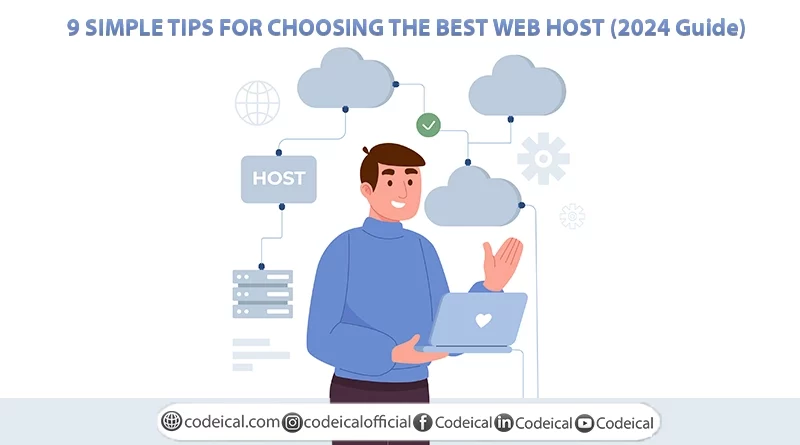9 Simple Tips For Choosing The Best Web Host (2024 Guide)
Selecting the perfect web host can feel overwhelming, especially for coding newcomers. With countless reliable options available, it’s easy to get lost. But don’t worry – finding the right host is essential for your tech journey.
Whether you’re building a portfolio to showcase your skills, creating a blog to share knowledge, or launching an online business, a strong web foundation is crucial.
So, what makes a great web host? And can you find one without breaking the bank?
This guide will walk you through the process, breaking down key factors and offering practical advice. Let’s dive in and find the ideal host for your project!
Table of Contents
ToggleKnow Your Specific Needs For Your Website
Selecting the ideal web host depends entirely on your website’s specific needs.
Your hosting provider should be well-versed in the tools you’ll be using. For instance, if you’re building a WordPress site, opt for a host popular within the WordPress community, such as Bluehost. E-commerce ventures require a host compatible with your chosen e-commerce platform.
To make an informed decision, ask yourself:
- What is your website’s purpose? Are you showcasing your work, selling products, or sharing information?
- What kind of website are you creating? Will you use a platform like WordPress, or build from scratch with HTML, CSS, JavaScript, and PHP?
- How many visitors do you anticipate monthly? Your host must handle your website’s expected traffic.
- Will you create multiple websites? Consider your long-term plans and the flexibility of your hosting package.
- What technical specifications does your website require? Ensure your host supports necessary programming languages.
- What additional features do you need? Look for domain registration, SSL certificates, custom email, e-commerce tools, etc.
Remember, cost-effective hosting is possible without sacrificing quality. Focus on essential features and tools. While some hosts cater to smaller websites, others excel at handling high-traffic online businesses.
Essentially, the best web host is one that perfectly aligns with your website’s requirements.

2: Check For Reliability And Uptime
A reliable website is essential for business success.
When you launch your website, you expect it to be accessible to visitors at all times. Unfortunately, no web host can guarantee 100% uptime. However, you should aim for a provider with a minimum of 99% uptime. Higher percentages, like 99.5% or above, are even better.
Why is uptime so important?
A website experiencing frequent downtime can lose valuable traffic and potential customers. Apologies aren’t enough when you’re missing out on leads and revenue.
How to choose a reliable web host:
- Check their uptime: Look for customer reviews and testimonials to gauge a host’s reliability.
- Read the fine print: Review the terms of service for any uptime guarantees or compensation options.
- Consider money-back guarantees: Some hosts offer refunds if they fail to meet their uptime promises.
By carefully selecting a web host with a strong uptime record, you can significantly reduce the risk of website downtime and its negative impact on your business.
3: Choose A Web Host With 24/7 Support
Even experienced website builders need help sometimes. You’re bound to have questions, no matter how many sites you’ve created. That’s why it’s crucial to choose a web host that offers top-notch support.
Look for a host that provides 24/7 assistance via phone, email, and live chat. Language support is also important, especially if you’re new to web development.
Before making a decision, read reviews of different web hosting providers. Pay close attention to what customers say about their support experience.
4: Explore Performance And Page Speed
A website’s loading speed is critical to its success. Visitors expect quick access and will abandon slow-loading sites in favor of faster competitors. Google’s research shows a 32% increase in bounce rates for pages taking 1 to 3 seconds to load.
Choosing the Right Web Host
Selecting a fast web host is essential for optimal performance. However, speed comes at a price. High-performance hardware and infrastructure are costly to maintain.
- Shared Hosting: Ideal for budget-conscious beginners with low traffic. Providers like Bluehost and Hostinger offer affordable options.
- VPS Hosting: Provides more resources and better performance than shared hosting at a higher cost.
- Dedicated Hosting: Offers maximum speed and control but requires server management skills and is the most expensive option.
- Hybrid or Custom Hosting: Combines the best of both worlds, providing high performance with specialized setups. Kinsta is a leading provider in this category.
Optimizing Your Website
While a good web host is crucial, website optimization is equally important. Large file sizes can significantly slow down loading times.
To improve your website’s speed:
- Image Optimization: Resize and compress images before uploading.
- Database Optimization: Regularly clean up your database to remove unnecessary data.
- Plugin Management: Limit the number of plugins to essential ones.
- Theme Selection: Choose a fast-loading theme like Astra for WordPress.
- Caching: Utilize a powerful caching plugin like WP Rocket for WordPress.
Performance Testing
Use tools like PageSpeed Insights, Pingdom, or GTmetrix to measure your website’s speed and identify areas for improvement.
By carefully selecting a web host and optimizing your website, you can significantly enhance user experience and drive better results.
5: Look for essential security features
Security is paramount when selecting a web host, especially if your site handles sensitive information like credit card details or personal data. Look for a host that employs firewalls and malware detection to safeguard their servers. Additionally, ensure they actively monitor server traffic for suspicious activity. An SSL certificate is essential to encrypt data transmitted through your website.
While these server-side protections are valuable, no system is completely immune to hacking. To mitigate risks, choose a host that provides regular website backups. Daily backups are ideal, but weekly backups suffice for less frequently updated sites. For added peace of mind, maintain a separate backup on your computer or cloud storage.
Recommendation: If you’re building a WordPress site, consider Kinsta for its exceptional security features.
Remember: Prevention is key, but having a backup plan is crucial.
6: Check for upgrade options
Even if you only need a single website right now, it’s wise to consider your hosting options for the future. While most providers offer affordable plans for one site, chances are you’ll expand your online presence eventually.
To ensure a smooth transition, check if your host offers upgrade paths. Here’s what to consider:
- Upgrade fees: Are there any charges to switch to a higher-tier plan?
- Support: Will your host handle the entire upgrade process?
- Downtime: Will your website be offline during the upgrade?
- Cost: How much will the upgraded plan be, and are there discounts for existing customers?
- Features: What additional benefits does the higher-tier plan offer?
In most cases, upgrading your hosting is hassle-free, and your provider will work to minimize any disruptions to your website.
Essentially, it’s worth planning ahead to avoid potential issues and ensure your website can grow with your needs.
7: Choose a monthly or annual payment interval
When choosing a payment plan, you have the flexibility of paying monthly or the potential savings of committing to an annual plan.
Monthly payments offer greater short-term flexibility as you’re only billed every 30 days. However, opting for an annual plan can result in significant cost savings.
Since most websites are long-term projects, choosing a longer plan often secures the lowest price. It’s unlikely you’ll launch a website only to take it down within a few months.
Ultimately, select a payment plan that suits your budget and long-term goals.
8: Check for hidden fees
Watch out for hidden costs when choosing a web host.
Many web hosts offer extra features and services for an additional fee. These might include security tools, SEO assistance, or premium WordPress plugins. While these can be helpful, they’re often unnecessary.
Some hosts might sneak extra charges into your final bill. So, always double-check the total before paying. Carefully read the terms and conditions to avoid surprises.
Pay close attention to these potential charges:
- Domain name registration or renewal
- Email accounts
- SSL certificates
- Overage fees for bandwidth
- Additional features or packages
If you get a hosting plan with free features for the first year, find out how much they’ll cost afterward.
9: Know the cancellation policy (and fees)
Prioritize cancellation terms when choosing a web host. It’s crucial to find a provider that allows you to cancel your service without incurring extra charges.
Navigating web hosting can be overwhelming for newcomers. Many hosts offer complex dashboards filled with unnecessary features, making it difficult to manage your website effectively.
You might decide to switch hosts. While rare, it’s essential to consider the possibility of changing providers and the ease of canceling your current plan.
Always read the fine print before signing up. Understanding the terms and conditions of your hosting plan is crucial to avoiding unexpected fees or difficulties when canceling.
Most hosts offer a trial period. Many web hosting providers offer a 30-day money-back guarantee, allowing you to test their services risk-free.
Be aware of domain name restrictions. Domain names typically cannot be refunded. If your hosting plan includes a free domain and you cancel within the refund period, you might be charged for the domain.
Clarify cancellation and refund policies. Before committing to a web host, contact their customer support to inquire about cancellation procedures and refund eligibility.
Final thoughts: How to choose the best web host easily
Selecting the ideal web host can be overwhelming. This guide aims to simplify the process.
To ensure a successful website launch, start by pinpointing your specific hosting requirements. Once you know your needs, compare different providers to find the best fit.
Key factors to consider:
- Reliability and Uptime: Aim for at least 99% uptime.
- Support: Accessible assistance is crucial.
- Performance and Speed: Choose a plan matching your budget and website needs.
- Security: Prioritize SSL certificates, backups, firewalls, and malware protection.
- Scalability: Ensure easy upgrades to accommodate growth.
- Cost: Opt for annual plans and watch out for hidden fees.
- Cancelation Policy: Avoid providers with cancellation charges.
Quick Tips for Different Website Types:
- Portfolio Website: Shared hosting is ideal. Bluehost offers excellent value.
- Blog: Start with shared hosting and consider upgrading to a higher-tier plan as your audience grows. Bluehost’s WordPress hosting is a good option.
- E-commerce Website: Prioritize strong security features. Kinsta and Bluehost provide robust e-commerce hosting solutions.
Happy building!
- CODEICAL


